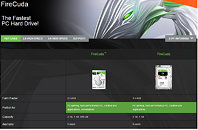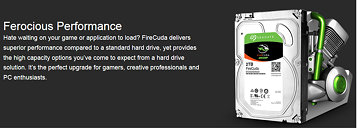Monday, October 24th 2016

Seagate Introduces the 5th Gen FireCuda SSHDs - Up to 2 TB, 8Gb NAND
Seagate has officially updated their FireCuda line, the solid-state supported, high-capacity hybrid drives. The new, 5th Gen models sport a thinner form-factor (2.5"), rocking the company's multi-tier cache technology as well as 1 TB SMR (Shingled Magnetic Recording) plates. The SMR plate's difference compared to conventional, perpendicular recording HDD technology allows these hybrid drives to increase storage density by up to 25%, by allowing newly-written magnetic tracks to partly overlap previously-written ones, reducing the amount of platter real-estate occupied.
The caveat with this technology is that the overlapping-tracks architecture may slow down the writing process, since writing to one track overwrites adjacent tracks, and requires them to be rewritten as well. However, according to Seagate, the large, multi-tier cache technology and large NAND caches are enough to offset any performance loss incurred by the SMR technology employed on these drives, and then some.The new FireCuda line will offer storage in 500 Gb, 1 TB and 2 TB capacities, bringing compatibility with a wider range of devices thanks to their reduced z-height of 7mm. These feature 5400 RPM spindle speed, coming in with 128 MB of DRAM cache buffer. The maximum transfer rate and average latency for the FireCuda 2.5" are rated at 140 MB/s and 5.6 ms respectively, with all capacities shipping with the same amount of DRAM cache memory and 8 GB of MLC NAND cache, which works by swapping frequently used data to the faster NAND memory. The drives leverage the SATA 6 Gb/s protocol, with power consumption rated at 0.45 W idle, 1.6/1.7 W read/write power for the 500 GB and 1 TB drives, and 0.5 W idle, 1.7/1.8 W read/write power for their 2 TB sibling.
While shipping of the drives is already underway, official prices or market availability dates still haven't been disclosed. However, the 2 TB model is reportedly going to cost around $100. The five-year warranty that Seagate offers on their FireCuda line of hybrid drives are sure to bring more value to the table, being longer than the standard 2-year on Seagate's family of Barracuda consumer HDDs.
The caveat with this technology is that the overlapping-tracks architecture may slow down the writing process, since writing to one track overwrites adjacent tracks, and requires them to be rewritten as well. However, according to Seagate, the large, multi-tier cache technology and large NAND caches are enough to offset any performance loss incurred by the SMR technology employed on these drives, and then some.The new FireCuda line will offer storage in 500 Gb, 1 TB and 2 TB capacities, bringing compatibility with a wider range of devices thanks to their reduced z-height of 7mm. These feature 5400 RPM spindle speed, coming in with 128 MB of DRAM cache buffer. The maximum transfer rate and average latency for the FireCuda 2.5" are rated at 140 MB/s and 5.6 ms respectively, with all capacities shipping with the same amount of DRAM cache memory and 8 GB of MLC NAND cache, which works by swapping frequently used data to the faster NAND memory. The drives leverage the SATA 6 Gb/s protocol, with power consumption rated at 0.45 W idle, 1.6/1.7 W read/write power for the 500 GB and 1 TB drives, and 0.5 W idle, 1.7/1.8 W read/write power for their 2 TB sibling.
While shipping of the drives is already underway, official prices or market availability dates still haven't been disclosed. However, the 2 TB model is reportedly going to cost around $100. The five-year warranty that Seagate offers on their FireCuda line of hybrid drives are sure to bring more value to the table, being longer than the standard 2-year on Seagate's family of Barracuda consumer HDDs.



26 Comments on Seagate Introduces the 5th Gen FireCuda SSHDs - Up to 2 TB, 8Gb NAND
Putting more or higher capacity chips on it would just inflate the price. And i doubt you'd need to cache 16gigs of data for quick access.
Use an actual ssd or ramdisk
I understand that for example movies will be stored on an HDD part of this hybrid drive, however say you start up a movie or a game, drive will move it to the 8gb ssd bit? or how does it work? Also if for example movie is blue-ray which will instantly exceed the, then we see a slowdown?
Thank you for clarifying.
So yeah, there are defenetly benefits to be had using more nand. And nand is cheap as it is and anything less than 16GB is harvastaed dies anyway (they don't make flash dies smaller than 128Gbit)
That bit is still unclear to me.
Higher hit rate for cache? Do you regularly use the A(to)Z of apps in existence to great depth on a daily basis? Because if thats the case, then maybe you need to look at an actual SSD and not a hybrid drive. For most of us, all we really want are fast boot times & a few of the regular apps we use like web browsers, word, excel -- productivity apps, media/3D content creating/editing tools, Maybe the odd game or two here or there depending on the size and its all gravy.
Get an 250GB SSD & 1TB Mechanical -- the SSD doesnt even need to be explosively fast or the top model. I can pick up a 240GB AMD Radeon SSD for £52 and a 1TB hard drive for £45. the SSD will be fine for windows and all my regular apps and maybe a few games depending on the size but it will smoke any hybrid drive any day.
I dont think you quite understand the use of a hybrid drive
the only place I see that they have any legitimate use is in laptops that need a lot of storage but only have 1 drive bay.
Not to mention the optical drive on your laptop can be converted to take an SSD -- there are loads of these bays available on amazon.
Still i had the opportunity to test both (specifically sammy 840 pro and a toshiba 1tb sshd with 8gb of flash). Toshiba drive even after a while to give it some time do do learning didn't fell all that snappier than your regular 2.5" 5400rpm drive. Maybe a little improvement, but not much. After switching to 840pro (got a very good price on it) it was a night and days experience.
So yeah, current hybrid drives make little sense, because onboard flash isn't fast enough and big enough to justify the extra premium (looking at the current pricing, 1TB 2.5" hybrid drive costs almost 28€ more).
For that kind of money, you can grab a cheap 60gb ssd, that will be miles faster than sshd setup.
yet they pulled it.
there are plenty of low end servers that run enterprise sata drives that don't have ssds. most servers out there don't have the option for ssd caching on the raid controller. lets take dell as an example. the perc 730 raid controller allows ssd caching. the perc 710 doesn't unless you flash avago's bios onto it voiding your warranty on the card. perc 710 was in use until last year.most laptops don't have m2 slots. a lot of the new ones do. thankfully my thinkpad has an easy swap between optical and 2nd hard drive bay and spare battery. I've had plenty of laptops that don't. as for external drives I've had too many fail to consider them reliable storage for everyday use.
I'm confused about which side you're on. you seem to think hybrid drives have a use. but you're own points argue against it.
How does seagate stay in business pushing out copious amounts of shit I have no idea.
Now, they have 16GB cache.
I personally have the 4GB version. It works fine as a boot drive. The booting time is almost the same as a pure SSD.
If you need speed, SSD. If you need storage, get a 4 TB without this overlapping memory thing. And if you are somehow in a position that a hybrid drive is your best option, they already have drives on the market with better performance and similar storage capacity.